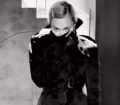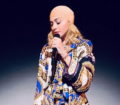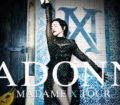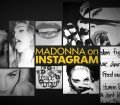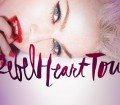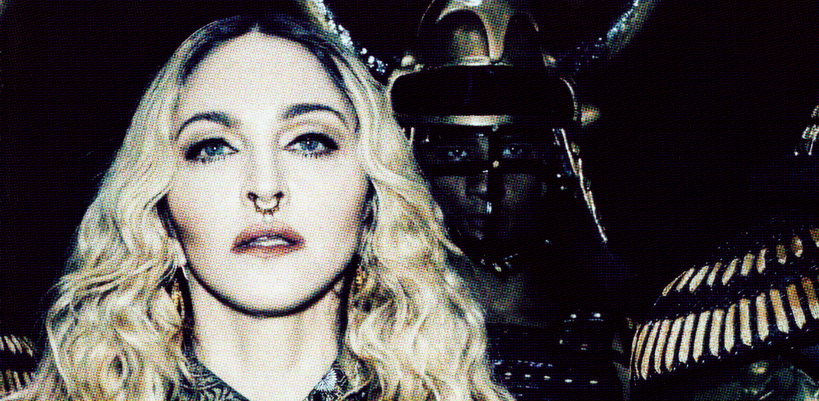
The day after the Philadelphia Rebel Heart Tour show, Madonna phoned up Rolling Stone to talk about the tour…
Rolling Stone: At what point in the creation of Rebel Heart did you start brainstorming ideas for this tour?
Madonna: Finishing my record was filled with panic and pressure because of all the leaks, so I wasn’t really thinking about my live show until I released the record and started making videos and doing my promo show. So honestly, I didn’t really try to sit down and get my head around it until last March. That’s unusual for me because I usually start thinking way, way, way in advance.Rolling Stone: When you did start plotting out the tour, what were your goals?
Madonna: My goals are always the same. I want to take people on a journey. I like to explore themes. I believe that if you’re going to a big venue like a sports arena or a stadium you need to present a kind of entertainment that interfaces with all of the senses.I don’t think it’s enough to just stand onstage and sing. I think that there are moments for that, but I’m a very visual person. I was trained as a dancer, so those kinds of things are really important to me, in my shows, anyway.
I feel like when the audience walks into a show, they walk into a magical world, and they’re transported for two hours to another time and place, and they plug into the matrix of my creative brain, which, generally, explores and expresses all of the things that I’m interested in, and/or inspired by. So that’s always my goal. And of course, it changes and shifts from record to record, from tour cycle to tour cycle. The moods I’m in, the themes I want to express, all of that.
Rolling Stone: What are the primary themes of this tour?
Madonna: The first message is empowerment, and we’re using the song “Iconic” as the opening. It talks about being a warrior and fighting for what you believe in, and recognizing that we all have the ability to be iconic in our own ways — to be warriors, to shine. Also, I’m honored that I had Mike Tyson is in my song and video, because I really look up to him and admire him as a person who has gone through the roller coaster of life, who has walked through the fire, gone through the darkness. And for me, he’s metamorphosed into a human being who is someone to look up to and be inspired by.So, that would be the first theme. And “Devil Pray” is a song about being sucked into the illusion that alcohol and weed can give you insight into sort of the upper world, so to speak, or can make you closer to God. And in fact, they do. But I think in the end it’s an illusion.
As I said, I don’t just jump from subject to subject, so we have to go on a journey. We have to start out as warriors, and then we explore themes of sex and religion, because they are things in our society that are always separated. And, to me, sex is a sacred gift that was given to us. It’s meant to be played with. I like to, obviously, provoke people with concepts of sex and religion’s point of view about it. That’s because I believe that people need to be challenged even if they disagree with me, which is fine. But I’m not gonna take you song-by-song. We’ll be talking for two hours.
Rolling Stone: How about you just tell me your process for picking which older songs to put into the set list. That couldn’t be easy.
Madonna: That is really, really hard. Basically, I go through the catalog, which is a pretty long list of songs. And once I got an idea for the themes I want to explore, I break the show down into four sections, and then I try and find ways to interweave my old songs with the new, and generally that has to do with themes. So we try a lot of stuff out, and it doesn’t work.Then we try things that I never would have thought of and it does work. It’s a very, very long process. That’s, for me, the biggest challenge, to marry the old with the new. Because obviously those songs I wrote a long time ago, and I have to reinvent them to a certain extent so that they speak to me now versus the woman that I was 30 years ago.
Rolling Stone: I’ve always admired that about your concerts. It would be so easy to simply do your 15 biggest hits and stick to the original arrangements, but you’ve never once taken that easy route.
Madonna: No. And I just couldn’t do it, anyway. I just couldn’t do it.Rolling Stone: Can you explain why?
Madonna: Because I’ve changed, and sonics have changed. The sound of a synth or an 808 [drum machine] … everything has just changed so much. If you put the exact song next to something new, it just sounds so small and mono. You know what I mean? They just can’t live together.Rolling Stone: “True Blue” was a really great moment, stripping it down like that.
Madonna: Yeah. I love performing that song and “La Vie En Rose.” They’re so much fun because there’s something naive and sweet about singing a song on a ukulele.Rolling Stone: Are you new to that instrument?
Madonna: Oh, God, yes [laughs]. I suck at it, basically. The chord progressions are completely different than they are on a guitar, so it’s not something I can play without thinking. But I have to constantly challenge myself. It’s a challenge for my every night, because a G on a ukulele doesn’t look like a G on a guitar. It’s a little tricky. Gotta pay attention.Rolling Stone: Tell me how you get in shape for a tour. You’re doing that show over 80 times in the coming months. That’s a lot to prepare for solely on a physical basis.
Madonna: Yeah. This is true, although I have to say I haven’t had as much time to train and prepare myself physically for this show as I have in the past with other shows. That’s just because I have four kids, and they take up a lot of time. So I have to choose between working out and spending time with them, and then also putting my show together. I have to find the balance of training enough so that I’m not winded and out of breath when I’m onstage, but also not wearing myself out, and also seeing my kids. The list goes on and on.Rolling Stone: Do you get something creatively out of doing a live show that you don’t get out of making movies or recording an album?
Madonna: Well, there’s nothing like a live show, obviously. Living on the edge, being out, never knowing what’s going to happen, it’s a dangerous place to be. You make mistakes, you’ve got to with those mistakes. You know, each audience is different. I love when the audience is alive and plays with me, like it was in Brooklyn. People get my sense of humor and I can riff off of them, both musically and just conversationally.When you do the same show every night, you have to build up your energy and get ready to be this life force and take the stadium or sports arena by storm. It’s a lot of work. And then coming down afterward is a lot of work, so there’s nothing like it.
For me, when you’re onstage, there’s no cheating. There’s just no cheating. When you’re in the studio you can do another take, you can fix things, you can re-tune your vocals. When you’re making a film you can go into the edit suite, you can fix things in post-production. I mean, it’s not live. A concert is just a whole different world.
Rolling Stone: Do you see yourself still doing tours in 10 or 15 years?
Madonna: I don’t even think that far in advance, but if I did travel around and perform and connect to audiences, I’m sure it would look and feel different than, say, the extravagant sort of musicals that I put on right now.Rolling Stone: Do you think you could enjoy a more stripped-down show that’s just you and a small band, minus all the production?
Madonna: I quite like the idea of just sitting on a stool with a bottle of wine, a guitar and working my stand-up comedy into the whole scenario. I like talking to audiences, telling stories. I think I could make an interesting show, to tell you the truth. I quite like the idea of doing something simple.Rolling Stone: This is your sixth tour of the 2000s. Part of the challenge must be finding ways to top yourself since you’ve done so many different things.
Madonna: I don’t think of it as topping myself. It’s like making a film, and then another film. You don’t have to top yourself. It’s just a different story I have to yell. I work with a lot of filmmakers and costume designers and choreographers and dancers, so it’s always going to be different.Rolling Stone: This crew of dancers was pretty amazing. It seemed like they were capable of anything.
Madonna: Yeah, they’re wonderful, super talented and unique. I always tell my dancers that they’re actors, they’re not dancers, and so much is going to be expected of them. I always say the word “intention.” I don’t just like waving my arm around for the sake of waving an arm around. Why are you doing this? What are you trying to say? So I think that’s what makes my shows different.Rolling Stone: It’s a funny coincidence that the Pope and you are hitting cities just days apart this week.
Madonna: [Laughs] It’s hilarious, yes. I’m hoping that we run into each other.Rolling Stone: You talked about him a lot at the show. Are you a fan?
I have a long relationship with the Pope, with the Vatican, with the Catholic Church, with my excommunication. Anyway, you know, I was raised a Catholic, and no matter what spiritual path I might go down, I always feel some kind of inexplicable connection with Catholicism. It kind of shows up in all of my work, as you may have noticed.Rolling Stone: Are you happy with the direction this Pope is taking the church?
I’ll state the obvious and say that he seems like he’s a much more open-minded individual, who seems to be moving outside of the dogma of the Catholic Church that has been set in stone since the days of Constantine. So I think it’s good.It’s good to look out into the big, wide world and see that we have changed, and at the end of the day the message of Jesus is to love your neighbor as yourself, and so that means not judging. And to do that, you have to be more open-minded and accepting of people who have lifestyles that you perceive as unconventional. So I think it’s good, yeah. And I also believe that he’s the kind of Pope you could sit down and have a cup of tea with, and/or that you could make a joke about something and he would laugh about it.
Rolling Stone: It’s funny to think back to the Blond Ambition Tour when the Pope tried to stop your show in Rome from even happening.
Madonna: Yes, he did do that. But times have changed so much then, in so many ways, and not just with the Pope.Rolling Stone: Do you think he’d enjoy the show?
Madonna: I do, actually, because at the end of the day, the message of my show is about love, and that’s his message.
Madame X is available in Box Set, CD, Vinyl and Cassette!
Get your copy HERE!
